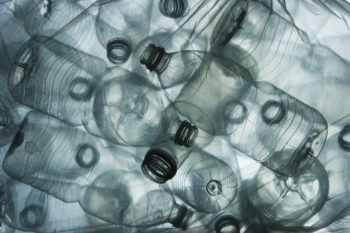Upcycling Plastic Waste Into High-Performing Mechanical Lubricants
New research could mean fewer adverse impacts from plastic waste and cheaper lubricants used in vehicles and industrial activities.

Finding new solutions to address the challenges posed by plastic waste can dramatically improve global sustainability practices and help achieve a greener future. While many researchers are working to solve this problem on an international scale, a new, multi-institutional team is seeking to turn that waste into a high-performing contributor.
The research team is working on upcycling plastic waste into liquid lubricants, including oil, hydraulic fluids, heat transfer fluids and greases.
Led by Iowa State University, the project team includes Argonne National Laboratory, Chevron Philips Chemical Company, Chemstations Inc., American Packaging Corp., the City of Ames Resource Recovery Facility and Hy-Vee, alongside Texas A&M University. Ali Erdemir, Halliburton Chair in Engineering Professor and professor in the J. Mike Walker’ 66 Department of Mechanical Engineering and the Department of Materials Science and Engineering, leads the efforts for Texas A&M.
The project is one of 12 funded by the U.S. Department of Energy’s Plastics Innovation Challenge, an initiative designed to reduce plastic waste in oceans and landfills, as well as help to position the U.S. as a global leader in plastics recycling technologies and in the manufacture of new plastics that are recyclable by design. Their research was recently published in the journal ChemSusChem.
Erdemir said the team is working toward the common goal of demonstrating that plastic wastes can be responsibly and economically upcycled into high-performance lubricants and used to minimize friction and wear. If successful, the team hopes their research could help reduce both energy consumption and greenhouse gas emissions.
“This project aims to reduce the adverse impacts made by hundreds of millions of tons of waste plastics through upcycling in order to support a circular economy with minimal environmental impact,” Erdemir said. “These responsibly recycled materials will provide new economic incentives by developing through a novel upcycling process to produce innovative value-added products.”
Erdemir said the general public could see day-to-day benefits from this research through a less adverse impact from plastic waste, and cheaper — and potentially better functioning — lubricants used in cars and other industrial activities.
“Reducing plastic wastes to lubricating oils is quite remarkable and may lead to a greener and more sustainable future,” Erdemir said. “Benefits could be huge as the end-products of this project will not only help reduce the adverse environmental impacts of plastic wastes, but also put them in use in a very green and continuously recyclable manner.”
By turning the waste into high-performing lubricants that perform as well or even better than their traditional counterparts, Erdemir said the mechanical components that utilize the lubricants for smooth and safe operation could benefit through mechanical durability, energy efficiency and environmental compatibility.
Moving forward, the team will be researching both the cost and technology needed to upcycle the plastic waste into lubricants, as well as how well the product ultimately performs.
“By the end of our project, we hope that we turn plastic trash into lubricating treasures in a sound and cost-effective way, thus helping alleviate the dire consequences of plastic wastes, which are already hurting our planet in so many ways,” Erdemir said. “If proven commercially viable, we expect our research findings to turn into a wide range of lubricating products — including engine oils and a wide range of industrial lubricants — that could help reduce energy consumption and the carbon footprint of future transportation and other industrial systems.”
Publication: Dr. Ryan A. Hackler, et al., Synthetic Lubricants Derived from Plastic Waste and their Tribological Performance, ChemSusChem (2023). DOI: 10.1002/cssc.202100912
Original Story Source: Texas A&M University

 Alerts Sign-up
Alerts Sign-up